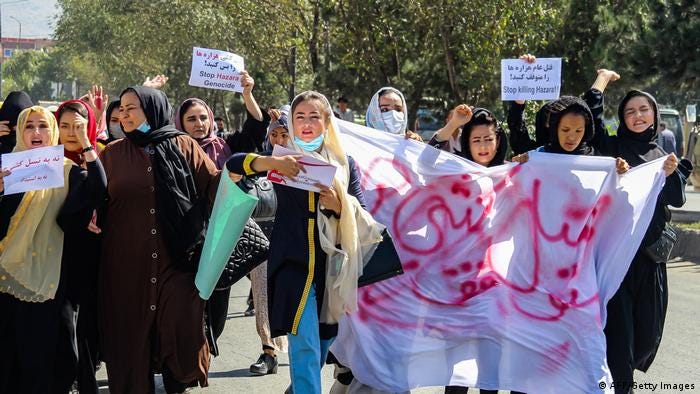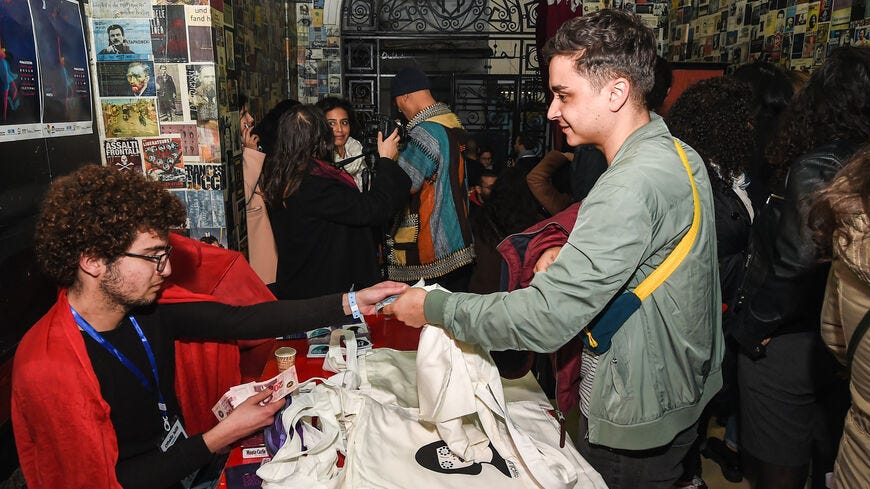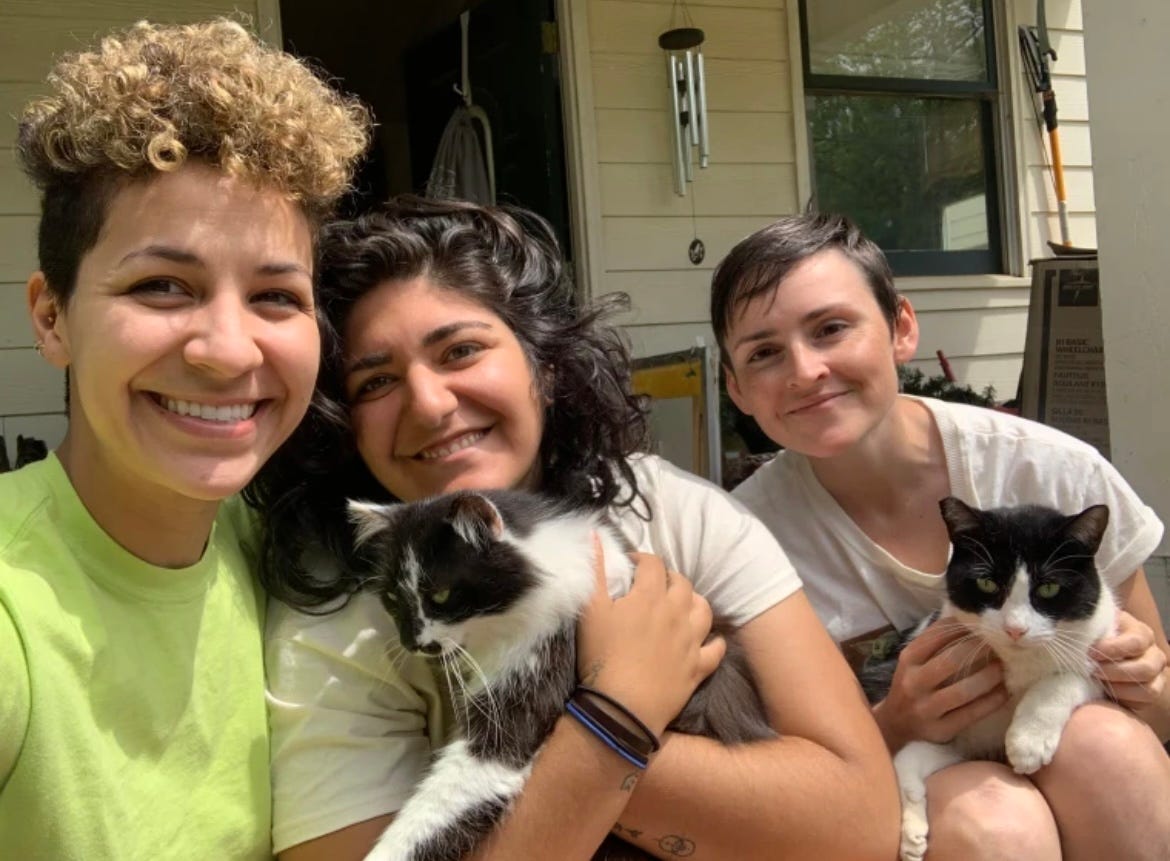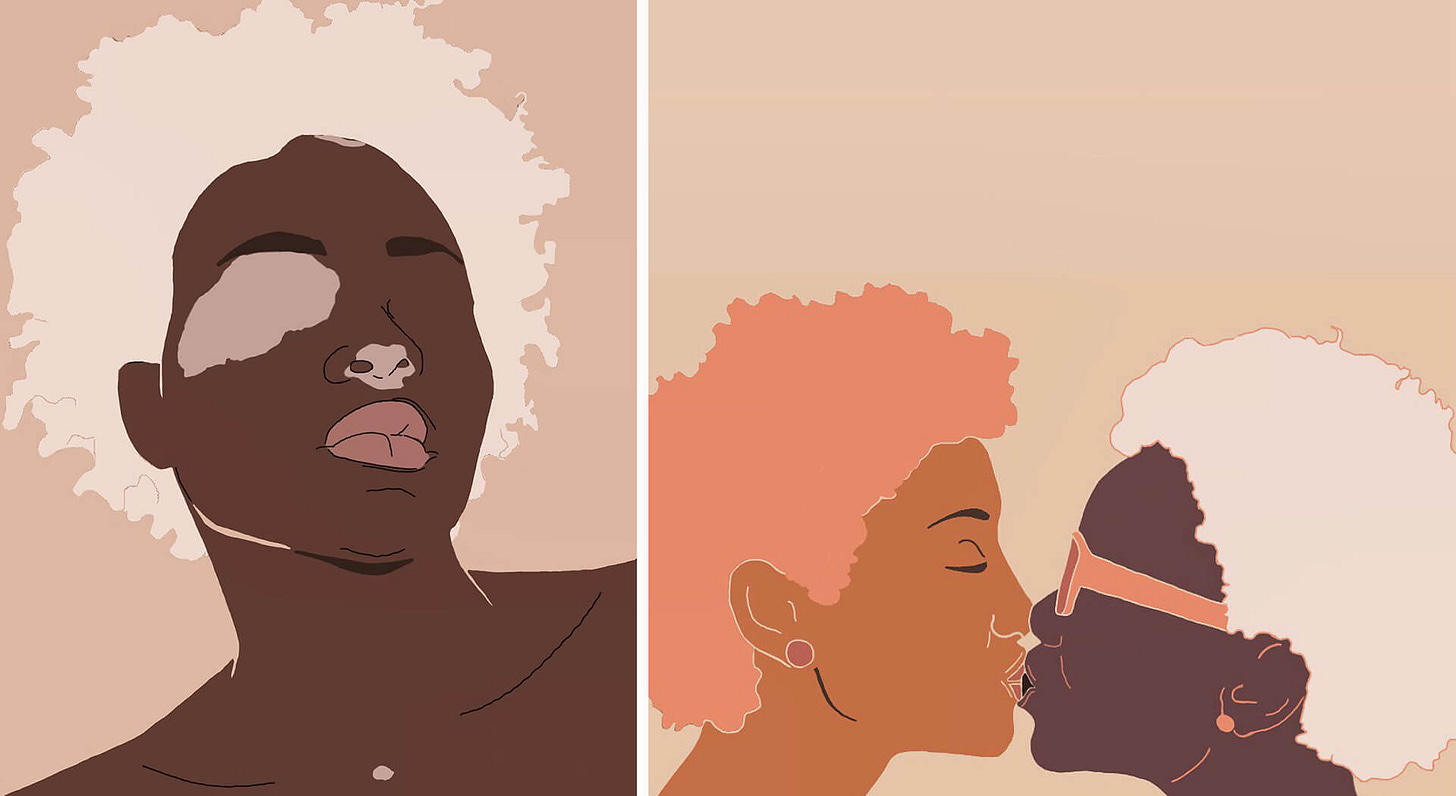Global Roundup: Women in Afghanistan and Ecuador Protest, Tunisia Queer Film Festival, First Muslim, Nonbinary and Non-Monogamous Legislator, Kenya Feminist Illustrator
Curated by FG Contributor Samiha Hossain
Getty Images via DW
The protest was in response to the recent suicide bombing in a Kabul study hall on Friday. Hundreds of students — largely women of the Hazara ethnic group — were taking tests in preparation for their university exams in the city's Dasht-e-Barchi area when the suicide bombing occurred. The community is a historically persecuted and oppressed group that has been targeted in other fatal attacks in Afghanistan. The UN says 35 were killed and 82 wounded.
We demand a stop to this genocide. We staged the protest to demand our rights. -Farzana Amadi, 19-year-old protester
"Stop Hazara genocide, it's not a crime to be a Shiite," roughly 50 women chanted, as they marched past a hospital in Dasht-e-Barchi where several victims of the attack were being treated. Dressed in the black hijabs and headscarves mandated by the Taliban, the women carried banners that read "Stop killing Hazaras."
Tens of heavily armed Taliban soldiers stood watch with rocket-propelled-grenade launchers as the Afghani women chanted protest slogans outside the hospital. In several online videos, protesters claimed that the Taliban forces were using violence to disperse them and had arrested several men who were accompanying them. The women also claimed that journalists covering the protests were beaten and their cameras were confiscated.
People gather outside the headquarters of Ecuador's National Police to protest the death of Maria Belen Bernal, whose police officer husband, according to the interior minister, is a suspect in the death, in Quito, Ecuador September 21, 2022. REUTERS/Karen Toro
Hundreds of women protested in Ecuador this weekend in the capital Quito and other regions against femicide, following a call from organizations to “stand united against the femicide state.” The demonstrators carried placards that read, "Look at me carefully because I could be the next victim." The protesters yelled, "We want to live."
The protesters were outraged by last month's case of a lawyer named Maria Belen Bernal, 34, who disappeared after entering a police station on her way to meet her husband. When reported, the police identified her husband as the main suspect and he is currently on the run in the case. Her body was recovered four days later on a hill about five kilometres from the police station. President Guillermo Lasso has since ordered the dismissal of two generals and Interior Minister Patricio Carrillo.
The protesters gathered in front of the police headquarters in the capital to paint the facade of the building in red and yellow and pelt the building with eggs. A sign that read "Murderous police" was placed on the ground where the officers were standing in riot gear with shields.
There have been 206 femicides in Ecuador since the beginning of the year, according to an NGO that monitors gender violence. The Attorney General's Office says that since 2014, 573 femicides have been committed, a crime punishable by up to 26 years in prison. According to official statistics, 65 out of 100 women between 15 and 49 have experienced some form of violence in Ecuador.
Tunisians arrive to attend the opening of the second edition of the Mawjoudin Queer Film Festival, Tunis, Tunisia, March 22, 2019. - Fethi Belaid/AFP via Getty Images via Al Monitor
The Mawjoudin Queer Film Festival (MQFF) returned to the Tunisian capital for its third edition after being postponed several times due to the pandemic – a long-awaited occasion for LGBTQI community members to finally meet up again in person. The four-day festival promoting queer culture in Tunisia and the Middle East and North Africa region was organized by the Tunisian association Mawjoudin (We Exist) that defends LGBTQI rights.
First and foremost, it’s a space of visibility, representation and awareness for the LGBTQ community. And it’s a place of cultural and human exchange. -Karam Aouini, MQFF organizer
Thirty-two films and documentaries, mainly from countries of the global south, were screened during the festival. It also featured art performances, workshops and panel discussions. Among the group discussions, one revolved around movement building and solidarity in the queer community, which was moderated by Ayouba Faktayri, a Moroccan nonbinary trans activist from the LGBT and feminist association Nassawiyat. Faktayri is also the regional coordinator of Transat, the first transgender advocacy group in the Middle East and North Africa.
Solidarity within the queer community has been a very important resistance mechanism in getting through the pandemic while staying connected, and trying to create a support system for our members. -Ayouba Faktayri
Aouini highlighted the importance of “intra-community solidarity” on issues of sexual health, mental and social well-being, and family acceptance. He said there was a larger selection of films this year, and a variety of activities were planned including for the first time a vogue dance workshop. He also stressed the festival’s focus on presenting cinematographic artwork from the region, given that queer filmmaking in the Southern Hemisphere receives less attention than in the global north.
The MQFF carries a crucial symbolic weight in Tunisia, where homosexuality remains criminalized and is punishable with up to three years in prison based on Article 230 of the penal code. This edition was arguably a show of defiance toward President Kais Saied who has repeatedly publicly stated to be in favor of the criminalization of homosexuality. The new constitution, approved by referendum in July, weakens safeguards to guarantee rights and freedoms. It also introduced a provision that states that Tunisia is part of the Islamic umma (community), and could be used to justify curbs on rights, including gender discrimination, based on religious precepts.
Mouna Jerbi was enthusiastic about attending the MQFF for the first time. In her view, sexual minorities should be part of the conversation just like other minorities in society. She qualified the event as something “revolutionary.”
The fact that we succeed in having a queer festival in an Arab Muslim country is an achievement. Coming to this event and meeting people like me is in itself something. We are not here to seek attention; we are here to just see our rights respected. -Mouna Jerbi
The MQFF took place in the backdrop of increasing police attacks on LGBT Tunisians. Yet despite the current autocratic climate and the ever-present LGBT-unfriendly attitudes in society, the MQFF is striving to keep the Tunisian queer scene alive.
Sarah Al-Khayyal, left, Liliana Bakhtiari, center, and Kris Brown, right, on their front porch with two of their cats, Moo and Rugrat.Courtesy Kris Brown via NBC
In the U.S., a Georgia politician is aiming to shift the conversation around having a non-normative sexual or romantic life. Atlanta City Council member Liliana Bakhtiari announced that they are non-monogamous and have happily been in a throuple with two partners—Kris Brown and Sarah Al-Khayyal—for years in an interview last week.
It should be destigmatized. [Non-monogamy is] a very valid familial structure that people should embrace. -Liliana Bakhtiari
Born in Atlanta to Iranian immigrants, Bakhtiari is the first queer Muslim person elected to public office in Georgia and the first nonbinary person elected to a major U.S. city council.
For Bakhtiari, the decision to come out was a long and careful one, as being publicly non-monogamous can come with major social and economic stigma, especially in politics. They said despite the fact that it can be used against them by a political opponent, they want to “claim it upfront.”
Brown said the three of them see nonmonogamy as an umbrella term, and under it there are a variety of relationship styles that can be romantic and/or sexual. One of the more well-known styles is polyamory, which means having more than one romantic partner, they explained.
Brown said the three of them prefer the label nonmonogamy over polyamory. “There are many more ways to be nonmonogamous than there are ways to be polyamorous, and we invite and enjoy the fluidity of the term nonmonogamy,” Brown said.
As some activists and academics have pointed out, non-monogamy itself is arguably a political act, especially in the U.S. and other countries whose histories have been shaped by colonial thought. According to Nana Darkoa Sekyiamah, author of The Sex Lives of African Women, British colonial governors outlawed many “immoral” relationship structures that deviated from monogamy in places like modern-day Ghana.
A diversity of relationship types was lost, and a form of relationships that wasn’t native to us became what was regarded as the norm. -Nana Darkoa Sekyiamah
By living openly and freely as a queer Muslim in a non-monogamous relationship, Bakhtiari rejects the status quo defined by cisheteropatriarchy.
If people don’t want to re-elect me because I’m in love with two wonderful people and in a happy and healthy relationship that is possibly the greatest thing that’s ever happened to me, then I’m good. -Liliana Bakhtiari
L: Vitiligo; R: Love is love; digital image. Image: Courtesy of Vanessa Mwangi
Vanessa Mwangi is a Kenya-based illustrator who established Gucora Andu, her digital art platform and uses her art to support black lives, feminism, and other causes. Gucora Andu translates to “draw people” in her mother tongue Kikuyu, a Kenyan language. When Mwangi is not sketching people, she is watching the news to know what is happening in and around the world, such as the Black Lives Matter movement that was the focus of her practice earlier.
Mwangi has always enjoyed sketching since she was in high school, but she did not begin until this year due to the pandemic. Her feminist art is a combination of pinks, browns, and warm colours, which has become a recurring subject for her. The pandemic provided her with the impetus for her platform and social art, as she gained insight into how others dealt with it through time and contemplation.
My art is inspired by feminist values and general social issues experienced all over the world. However, initially and even occasionally, the art stems from my own feminist perspective. -Vanessa Mwangi
Mwangi says that Gucora Andu is a platform that promotes and encourages feminist values. She does not want her illustrations to be hard to interpret and wants her work to be recognized anywhere. She intends to make her work “relatable” and “impactful.”
If my art can spark conversation or emotion, then I have done my job. -Vanessa Mwangi
When Mwangi got her first client, an NGO called Girls Not Brides, she knew she was moving in the right direction, and began to focus her work more on feminist values and social issues, things she already cared a lot about. Her favorite artwork of hers is Vitiligo, a piece that she created for African Women’s Day for the Say Enough Campaign, a product by Oxfam International. The campaign theme was #FlipTheScript, and she was meant to share her concept of ideal Black beauty. She discusses how those with the skin condition vitiligo are stigmatized and isolated in Africa, so she wanted to portray a strong Black woman with vitiligo embracing her skin.
Now that Mwangi has a better idea of what Gucora Andu is about, she says “the sky is the limit.” She is working on getting funding for a few projects and is looking forward to creating a body of work that focuses on the African woman’s female body and its experiences, for example, the menstrual cycle, inspired by an illustrator called Pink Bits.
Samiha Hossain (she/her) is a student at the University of Ottawa. She has experience working with survivors of sexual violence in her community, as well as conducting research on gender-based violence. A lot of her time is spent learning about and critically engaging with intersectional feminism, transformative justice and disability justice.
Samiha firmly believes in the power of connecting with people and listening to their stories to create solidarity and heal as a community. She refuses to let anyone thwart her imagination when it comes to envisioning a radically different future full of care webs, nurturance and collective liberation.






